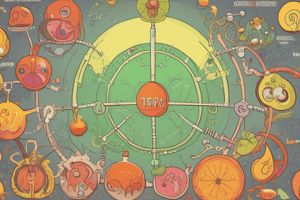Podcast
Questions and Answers
How many ATP are produced from the complete mitochondrial oxidation of pyruvate to CO2?
How many ATP are produced from the complete mitochondrial oxidation of pyruvate to CO2?
- 12
- 18
- 20
- 15 (correct)
What is the byproduct of the oxidation of pyruvate via the PDH complex?
What is the byproduct of the oxidation of pyruvate via the PDH complex?
- NADH (correct)
- GTP
- FADH2
- Acetyl CoA
During the TCA cycle, how many NADH molecules are produced?
During the TCA cycle, how many NADH molecules are produced?
- 2
- 4
- 1
- 3 (correct)
What is the role of nucleoside diphosphate kinase in the TCA cycle?
What is the role of nucleoside diphosphate kinase in the TCA cycle?
How many ATP are produced by the electron transport chain from the oxidation of NADH and FADH2?
How many ATP are produced by the electron transport chain from the oxidation of NADH and FADH2?
What is the net ATP gain from substrate-level phosphorylation in the TCA cycle?
What is the net ATP gain from substrate-level phosphorylation in the TCA cycle?
What is the coenzyme required for the reaction releasing the second CO2 and producing the second NADH of the cycle?
What is the coenzyme required for the reaction releasing the second CO2 and producing the second NADH of the cycle?
What is the product that inhibits the α-ketoglutarate dehydrogenase complex?
What is the product that inhibits the α-ketoglutarate dehydrogenase complex?
What is the energy-rich thioester similar to acetyl CoA formed in the reaction?
What is the energy-rich thioester similar to acetyl CoA formed in the reaction?
How is the α-ketoglutarate dehydrogenase complex regulated?
How is the α-ketoglutarate dehydrogenase complex regulated?
What is the byproduct of the reaction that produces the second NADH of the cycle?
What is the byproduct of the reaction that produces the second NADH of the cycle?
What is the enzyme complex responsible for the reaction that produces the second NADH of the cycle?
What is the enzyme complex responsible for the reaction that produces the second NADH of the cycle?
How many NADH molecules are produced in the reaction catalyzed by the α-ketoglutarate dehydrogenase complex?
How many NADH molecules are produced in the reaction catalyzed by the α-ketoglutarate dehydrogenase complex?
What is the other way α-ketoglutarate is produced in the cell?
What is the other way α-ketoglutarate is produced in the cell?
During one turn of the citric acid cycle, how many pairs of electrons are transferred?
During one turn of the citric acid cycle, how many pairs of electrons are transferred?
What is the approximate ATP yield from the oxidation of one FADH2?
What is the approximate ATP yield from the oxidation of one FADH2?
What is the net consumption or production of OAA during the citric acid cycle?
What is the net consumption or production of OAA during the citric acid cycle?
What is the role of the electron transport chain in the citric acid cycle?
What is the role of the electron transport chain in the citric acid cycle?
What is the total ATP yield from the oxidation of one acetyl-CoA?
What is the total ATP yield from the oxidation of one acetyl-CoA?
How many molecules of NADH are generated during one turn of the citric acid cycle?
How many molecules of NADH are generated during one turn of the citric acid cycle?
What is the reaction that generates ATP through substrate-level phosphorylation?
What is the reaction that generates ATP through substrate-level phosphorylation?
How many carbon atoms enter the citric acid cycle?
How many carbon atoms enter the citric acid cycle?
Flashcards are hidden until you start studying
Study Notes
TCA Cycle
- One round of the TCA cycle produces 3 NADH, 1 FADH2, and 1 GTP (whose terminal phosphate can be transferred to ADP by nucleoside diphosphate kinase, producing ATP).
- The generation of acetyl-CoA by the oxidation of pyruvate via the PDH complex also produces an NADH.
- Oxidation of the NADH and FADH2 by the electron transport chain yields 14 ATP.
- An additional ATP (GTP) comes from substrate-level phosphorylation in the TCA cycle.
- Therefore, a total of 15 ATP are produced from the complete mitochondrial oxidation of pyruvate to CO2.
Coenzymes and Reaction Equilibrium
- The coenzymes required are TPP, lipoic acid, FAD, NAD+, and CoA.
- Each functions as part of the catalytic mechanism in a way analogous to that described for the PDH complex.
- The reaction equilibrium is far in the direction of succinyl-CoA, a high-energy thioester similar to acetyl-CoA.
Regulation of α-Ketoglutarate Dehydrogenase
- α-Ketoglutarate dehydrogenase complex is inhibited by its products, NADH and succinyl-CoA, and activated by Ca2+.
- It is not regulated by phosphorylation/dephosphorylation reactions, unlike the PDH complex.
Energy Produced by the TCA Cycle
- 3 NADH produce 9 ATP each
- 1 FADH2 produces 2 ATP
- 1 GTP produces 1 ATP
- Total ATP produced per acetyl-CoA oxidized: 12
Studying That Suits You
Use AI to generate personalized quizzes and flashcards to suit your learning preferences.




